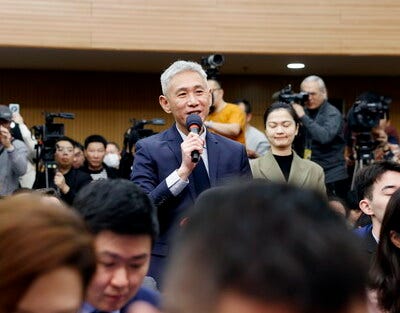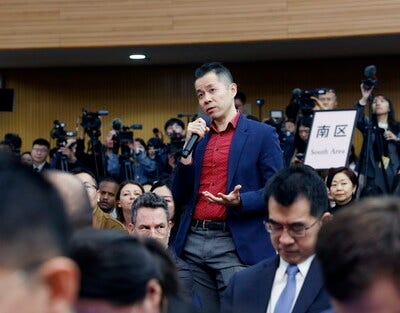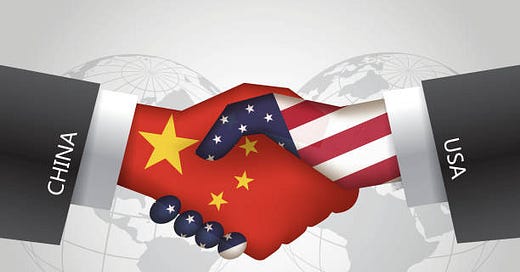In my March 14 commentary, I provided a detailed review of the March 7 press conference held by Wang Yi, Foreign Minister of the People’s Republic of China. The commentary seeks to persuade the people of the United States and the West that China has been for the last quarter century sincerely committed to developing mutually beneficial trade with the nations of the Global South, and that China seeks to play a leadership role in the construction of a more just world defined by international norms of cooperation and win-win relations, constructing the new world order patiently and step by step and not by tearing apart the established world-system. (See “Wang speaks on international situation: Chinese Foreign Minister reaffirms China’s commitment to South-South cooperation.” March 14, 2025).
In the press conference, Wang expressed the possibility of China-U.S. cooperation, and he also criticized the Trump administration’s “America First” policy. I critically engage the Foreign Minister’s comments in today’s commentary.

A representative of Reuters asserted, “Right after Trump returned to the White House, he imposed fresh tariffs on China over fentanyl. But at the same time, he is offering to build a good relationship with China.” He asked, “How differently will China engage with the Trump administration over the next four years compared to his previous term?”
The Chinese Foreign Minister responded that mutual respect is a basic norm governing relations among states, and it is “an important prerequisite for China-U.S. relations.” He added that “no country should fantasize that it can suppress China and maintain good relations with China at the same time. Such two-faced acts are not good for the stability of bilateral relations, or for building mutual trust.”
With respect to fentanyl, Wang stressed that “China always takes resolute measures against drug trafficking and manufacturing, and China has put in place the toughest and most comprehensive counternarcotics policies in today’s world.” In 2019, at the request of the Trump administration, China became the first country to list all fentanyl-related substances. Wang further maintained that “the abuse of fentanyl in the United States is a problem that must be confronted and resolved by the United States itself.” In this matter, China has been assisting the United States in various ways, on humanitarian grounds.
In addition, Wang declared that “China-U.S. business relations are based on two-way and reciprocal interactions,” rooted in mutually beneficial and win-win cooperation. But “China will definitely take countermeasures in response to arbitrary pressure,” such as arbitrary tariffs.
The Chinese Foreign Minister concluded his response to Reuters’ question by expressing the need and the potential for cooperation between China and the United States.
As the world’s largest developing and developed countries respectively, China and the United States will stay on this planet for a long time. They must therefore seek peaceful coexistence. As President Xi Jinping noted in his telephone call with President Donald J. Trump earlier this year, confrontation and conflict should not be an option. Given the extensive common interests and broad space for cooperation, it is possible for China and the United States to become partners helping each other succeed and prosper together. China will stay committed to the three principles proposed by President Xi Jinping—mutual respect, peaceful coexistence and win-win cooperation—in promoting steady, sound and sustainable development of China-U.S. relations. At the same time, we hope that the U.S. side will listen to the calls of the two peoples, see clearly the trend of the times, take an objective and rational view of China’s development, engage proactively with China in practical exchanges, and work together with China to pursue the right way of getting along with each other to the benefit of the two countries and the whole world.
Well said, and an important declaration. Moreover, the objective need for U.S. cooperation applies not only to China, but all the nations of the Global South, large and small, because many of them are ready and able to resist imperialist plans, even at material costs to themselves, because they decide for sacrifice in defense of national dignity over surrender to bullying powers. Their inevitable resistance renders imperialist plans too costly.
The high cost of imperialist overreach occurs in a historic moment in which the territorial expansion of the world-system has overreached its geographical and ecological limits, making new colonial conquests impossible. Colonialism and imperialism, which in their day were the driving forces of human economic and technological development, are now outdated. Only a world-system in political and moral decadence would continue to apply outdated methods in a systematic manner.
The United States must now arrive to understand that North-South cooperation is a need of the world-system, established by its objective conditions. In our days, the call for peace and cooperation among nations is not a moral call, but a scientifically based appeal to common-sense intelligence.
Instead of bashing China, or attacking the USA as an unredeemable imperialist power, or attacking the Trump administration as a new form of fascism, U.S. analysts ought to repeatedly proclaim and explain the objective need for cooperation and mutually beneficial trade among the nations of the world, seeking to establish it as a pillar of American public opinion and as a fundamental demand of the people.

A representative of CNN noted that “President Trump has adopted an ‘America First’ policy after his return to the White House. He has spoken about withdrawing from international organizations and treaties including the U.N. Human Rights Council and the World Health Organization.” He asked, “Does this provide a strategic opportunity for China to reshape the global landscape through international engagement?”



